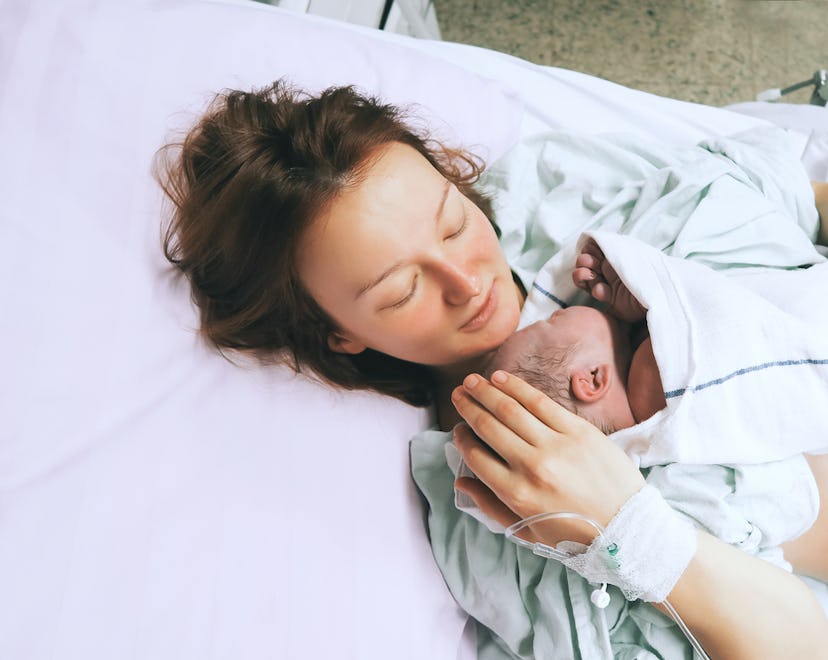Pregnancy

Do Babies Feel The Umbilical Cord Being Cut?
Experts tell us whether one of life’s first sensations is a snip.
One of the first things that doctors and midwives do after birthing a baby is to cut the baby’s umbilical cord. Since the baby is likely to be crying when that’s happening, you have to wonder do babies feel the umbilical cord being cut?
Since labor and birth is such an emotional time, it helps to know as much information as possible beforehand. Knowledge can make you feel a little less anxious and stressed, which is good for you, your baby, and everyone else in the room. We spoke to experts about those first critical moments to set your mind at ease.
What Exactly Does The Umbilical Cord Do?
First and foremost, you should understand exactly what the purpose of the umbilical cord is. Think of the umbilical cord as a little tube of nutrients that helps keep your baby healthy and thriving. This flexible cord of tissue is what brings oxygen, blood, and nutrients from the mother to the baby.
Liesel Teen, BSN, RN, labor and delivery nurse and founder of Mommy Labor Nurse, explains, “One end of the cord is attached to the placenta, while the other end of the cord is attached to baby at the umbilicus (belly button). The umbilical cord contains one vein, which carries oxygenated blood to baby, and two arteries, which carries deoxygenated blood and waste back to the placenta. These vessels are protected by a gelatinous substance called Wharton’s jelly and everything is housed within a thin membrane.” All in all the umbilical cord is super important during pregnancy. Afterwards? Not so much.
Why Is The Umbilical Cord Cut?
Once your little bundle of joy enters the world, they really have no need for the umbilical cord anymore—also, it essentially stops doing its job. “Once baby is born, the arteries and vein within the cord will begin to close and the flow of blood between baby and the placenta will stop,” Teen says. The cord needs to be clamped and cut in order to separate the baby from the placenta.
According to Teen, the umbilical cord is typically clamped and cut 30-60 seconds after baby is delivered. If the baby needs immediate medical attention, the cord is clamped and cut immediately and the newborn is taken to a baby warmer to be stabilized.
Do Babies Feel The Umbilical Cord Being Cut?
Rest assured, cutting the umbilical cord will not harm your baby. In fact, they won’t even feel it. Teen assures us, “The umbilical cord does not contain nerve endings, therefore it does not hurt mom or baby when the cord is cut.”
Is Delayed Cord Cutting A Good Option?
At some point in your pregnancy, you may have heard of delayed cord cutting. This means that instead of waiting the typical 30-60 seconds to clamp and cut the cord, you would choose to have the doctor clamp and cut the cord after it stops pulsing, which would be about 3-5 minutes. Teen says that many providers do this for every baby aside from those that need immediate medical attention, but sometimes mothers specifically ask for it to happen.
Delayed cord cutting has some benefits. “Allowing extra time before clamping the cord can increase the blood volume in your baby by up to one third,” Teen says. According to Teen, other benefits include improved developmental outcomes in the future, an increase in baby’s hemoglobin and hematocrit levels at birth, and an increase in brain myelination. There are also many benefits for preterm babies.
There are some risks as well. “The biggest risk associated with delayed cord clamping is that there is a small increase in the incidence of jaundice in term babies whose cord clamping and cutting is delayed,” Teen says. “In addition to an increased risk of jaundice, delayed cord clamping can result in an excess of red blood cells to be present in baby’s circulatory system, which can lead to breathing and circulatory issues.”
It makes sense to ask your doctor or midwife when they typically clamp and cut the cord and then tell them in advance what your wishes are.
Either way, cord cutting doesn’t hurt the baby.
Experts:
Liesel Teen, BSN, RN, labor and delivery nurse and founder of Mommy Labor Nurse
This article was originally published on